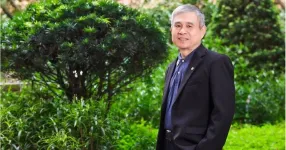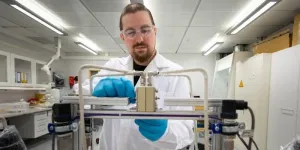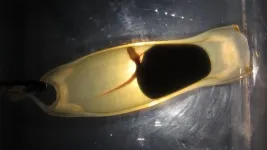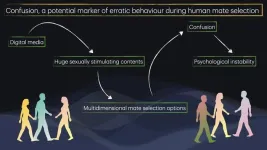(Press-News.org) A key mechanism which detects when the brain needs an additional energy boost to support its activity has been identified in a study in mice and cells led by UCL scientists.
The scientists say their findings, published in Nature, could inform new therapies to maintain brain health and longevity, as other studies have found that brain energy metabolism can become impaired late in life and contribute to cognitive decline and the development of neurodegenerative disease.
Lead author Professor Alexander Gourine (UCL Neuroscience, Physiology & Pharmacology) said: “Our brains are made up of billions of nerve cells, which work together coordinating numerous functions and performing complex tasks like control of movement, learning and forming memories. All of this computation is very energy-demanding and requires an uninterrupted supply of nutrients and oxygen.
“When our brain is more active, such as when we’re performing a mentally taxing task, our brain needs an immediate boost of energy, but the exact mechanisms that ensure on-demand local supply of metabolic energy to active brain regions are not fully understood.”
Prior research has shown that numerous brain cells called astrocytes appear to play a role in providing the brain neurons with energy they need. Astrocytes, shaped like stars, are a type of glial cell, which are non-neuronal cells found in the central nervous system. When neighbouring neurons need an increase in energy supply, astrocytes jump into action by rapidly activating their own glucose stores and metabolism, leading to the increased production and release of lactate. Lactate supplements the pool of energy that is readily available for use by neurons in the brain.
Professor Gourine explained: “In our study, we have figured out how exactly astrocytes are able to monitor the energy use by their neighbouring nerve cells, and kick-start this process that delivers additional chemical energy to busy brain regions.”
In a series of experiments using mouse models and cell samples, the researchers identified a set of specific receptors in astrocytes that can detect and monitor neuronal activity, and trigger a signalling pathway involving an essential molecule called adenosine. The researchers found that the metabolic signalling pathway activated by adenosine in astrocytes is exactly the same as the pathway that recruits energy stores in the muscle and the liver, for example when we exercise.
Adenosine activates astrocyte glucose metabolism and supply of energy to neurons to ensure that synaptic function (neurotransmitters passing communication signals between cells) continues apace under conditions of high energy demand or reduced energy supply.
The researchers found that when they deactivated the key astrocyte receptors in mice, the animal’s brain activity was less effective, including significant impairments in global brain metabolism, memory and disruption of sleep, thus demonstrating that the signalling pathway they identified is vital for processes such as learning, memory and sleep.
First and co-corresponding author Dr Shefeeq Theparambil, who began the study at UCL before moving to Lancaster University, said: “Identification of this mechanism may have broader implications as it could be a way of treating brain diseases where brain energetics are downregulated, such as neurodegeneration and dementia.”
Professor Gourine added: “We know that brain energy homeostasis is progressively impaired in ageing and this process is accelerated during the development of neurodegenerative diseases such as Alzheimer’s disease. Our study identifies an attractive readily druggable target and therapeutic opportunity for brain energy rescue for the purpose of protecting brain function, maintaining cognitive health, and promoting brain longevity.”
The researchers were supported by Wellcome, and the study involved scientists at UCL, Lancaster University, Imperial College London, King’s College London, Queen Mary University of London, University of Bristol, University of Warwick, and University of Colorado.
END
Discovery of cellular mechanism to maintain brain’s energy could benefit late-life brain health
2024-07-03
ELSE PRESS RELEASES FROM THIS DATE:
Extinct humans survived on the Tibetan plateau for 160,000 years
2024-07-03
Bone remains found in a Tibetan cave 3,280 m above sea level indicate an ancient group of humans survived here for many millennia, according to a new study published in Nature.
The Denisovans are an extinct species of ancient human that lived at the same time and in the same places as Neanderthals and Homo sapiens. Only a handful Denisovan remains have ever been discovered by archaeologists. Little is known about the group, including when they became extinct, but evidence exists to ...
PolyU study reveals the mechanism of bio-inspired control of liquid flow, enlightening breakthroughs in fluid dynamics and nature-inspired materials technologies
2024-07-03
The more we discover about the natural world, the more we find that nature is the greatest engineer. Past research believed that liquids can only be transported in fixed direction on species with specific liquid communication properties and cannot switch the transport direction. Recently, The Hong Kong Polytechnic University (PolyU) researchers have shown that an African plant controls water movement in a previously unknown way – and this could inspire breakthroughs in a range of technologies in fluid dynamics and nature-inspired materials, including applications that require multistep and repeated reactions, such as microassays, medical ...
Early-onset El Niño means warmer winters in East Asia, and vice versa
2024-07-03
Fukuoka, Japan—The phenomenon known as El Niño can cause abnormal and extreme climate around the world due to it dramatically altering the normal flow of the atmosphere. In Japan, historical data has shown that El Niño years tend to lead to warmer winters. This case was exemplified recently with Japan’s warm 2023-2024 winter season. However, there have also been cases of cold winters in Japan during El Niño years, such as the one recorded in 2014-2015. Yet, it was unclear as to why this was occurring.
Publishing in the Journal of Climate, ...
How to avoid wasting huge amounts of energy
2024-07-03
Norway wastes huge amounts of energy. Surplus heat produced by industry is hardly exploited at all.
Researchers at the Norwegian University of Science and Technology (NTNU) have been looking at the possibilities for doing something about this.
“Surplus heat from industrial processes is a huge resource,” says Kim Kristiansen.
He has just completed his PhD on a technology that can harness some of the surplus heat that currently goes to waste. Almost all the heat generated by industrial processes is currently released directly into the air or the ocean, and we are not talking about small amounts. In Norway alone, industry produces ...
Bowel cancer turns genetic switches on and off to outwit the immune system
2024-07-03
Bowel cancer cells have the ability to regulate their growth using a genetic on-off switch to maximise their chances of survival, a phenomenon that’s been observed for the first time by researchers at UCL and University Medical Center Utrecht.
The number of genetic mutations in a cancer cell was previously thought to be purely down to chance. But a new study, published in Nature Genetics, has provided insights into how cancers navigate an “evolutionary balancing act”.
The researchers found that mutations in DNA repair genes can be repeatedly created and repaired, acting as ‘genetic switches’ that take the brakes off a tumour’s growth ...
Shark hatching success drops from 82% to 11% in climate change scenario
2024-07-03
New experimental research shows that the combined effects of ocean warming and acidification could lead to a catastrophic decrease in embryonic shark survival by the year 2100. This research is also the first to demonstrate that monthly temperature variation plays a prominent role in shark embryo mortality.
Oceanic warming and acidification are caused by greater concentrations of CO2 dissolving into marine environments, resulting in rising water temperatures and falling pH levels. “The embryos of egg-laying ...
Meet the team 3D modelling France’s natural history collections
2024-07-03
France’s natural history collections contain nearly 6% of the world’s total natural specimens across multiple institutions, and the e-COL+ project aims to capture and reconstruct these specimens in 3D for easy access and 3D printing around the world.
“I’m a researcher of vertebrate locomotion and vocalisation, so I produce a lot of CT scans and 3D models – and now I’m in charge of developing the museum’s own 3D digital collection,” ...
Artificial light is a deadly siren song for young fish
2024-07-03
New research finds that artificial light at night (ALAN) attracts larval fish away from naturally lit habitats, while dramatically lowering their chances of survival in an “ecological trap”, with serious consequences for fish conservation and fishing stock management.
“Light pollution is a huge ongoing subject with many aspects that are still not well understood by scientists,” says Mr Jules Schligler, a PhD student at CRIOBE Laboratory (Centre de Recherches Insulaires et Observatoire de l’Environnement) in Moorea, French Polynesia.
ALAN is the product of human-related ...
Social media is a likely cause of ‘confusion’ in modern mate selection
2024-07-03
A recent sociological study finds that most young adults surveyed reported feeling confused about their options when it comes to dating decisions. Preliminary analysis suggests that more than half of young people experience confusion about choosing life-partners, with women appearing to be more likely to report partner selection confusion than men.
Due to the pervasiveness of social media and digital dating in everyday lives, humans are now exposed to many more potential mates than ever before, but the availability of popular dating apps ...
Exploring bird breeding behaviour and microbiomes in the radioactive Chornobyl Exclusion Zone
2024-07-03
New research finds surprising differences in the diets and gut microbiomes of songbirds living in the radiation contaminated areas of the Chornobyl Exclusion Zone, Ukraine. This study is also the first to examine the breeding behaviour and early life of birds growing up in radiologically contaminated habitats.
The Chornobyl Exclusion Zone (Ukrainian), also known as the Chernobyl Exclusion Zone (Russian), is an area of approximately 2,600 km2 of radiologically contaminated land that surrounds the Chornobyl Nuclear Power Plant. The levels of contamination are uneven throughout the zone.
“The ...





